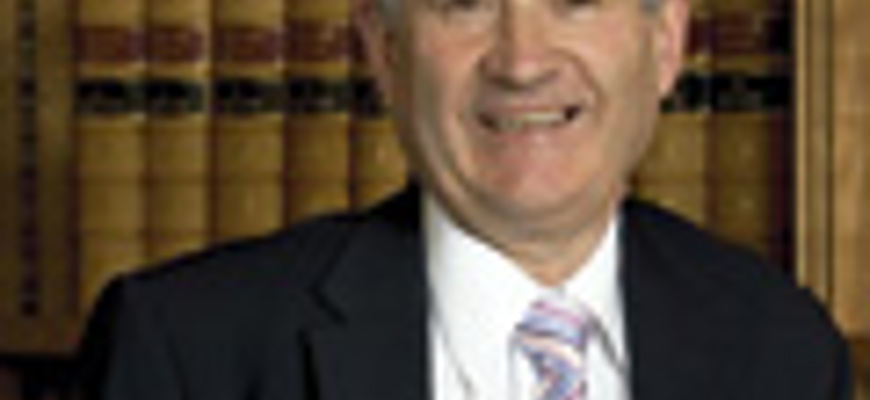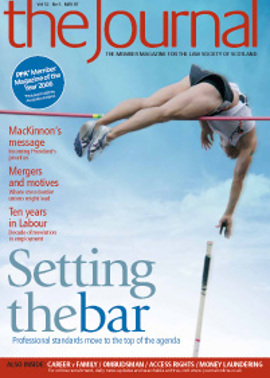Raising the standard

He may be your typical traditional High Street solicitor, but the Law Society of Scotland’s next President is under no illusions as to the significance of the changes facing the profession or how it needs to respond.
Having lived and worked in Fraserburgh since completing his Aberdeen LLB and Edinburgh training in 1970, John MacKinnon readily identifies with the perspectives of Scotland’s numerous small firms. Eleven years on Council have however kept him well up to speed with the increasing pace of change in recent times.
Now, with the setting up of the Scottish Legal Complaints Commission to take place during his year in office, he is very clear as to the current number one priority for action.
“I want to progress the setting of standards for the profession as Ruthven Gemmell outlined at the AGM, making sure that the profession is informed about the expectations of the Commission and is ready and able to deal with the Commission when it opens its doors.”
Standard bearers
“Think standards” could become something of a mantra for the Society in the coming months. Certainly it appears set to permeate a large part of the Society’s work. One instance is the likely shakeup of education and training (both pre- and post-qualifying), once the analysis of the online consultation is complete. As John MacKinnon points out, “This again raises the question of standards, standards for qualification, standards for continuing professional development… it seems there’s no getting away from standards!” So there’s a closer link with complaints than you might think? “Exactly. And we’ve got to get home to the profession the importance of standards.”
At the same time, the maintaining of high standards should not present as too much of a culture shock to most firms. Asked how tough it is for the High Street firm today as compared with other points in his career, MacKinnon points to how competitive everything now is, in Fraserburgh as elsewhere. “It all comes back again to providing a good service. You have to really work hard for it, but I don’t think it’s any more difficult than it was before.” And he accepts that the findings of recent Cost of Time Surveys, indicating that smaller firms have generally been doing quite well for themselves, are a fair reflection of the position on the ground.
In parallel with setting the benchmarks for the profession to thrive in changing times, the Society has also recognised the need to re-examine its own future direction. A working group was reporting to the April Council meeting on both fronts. MacKinnon is prepared to contemplate major structural change. “The profession has changed dramatically since I joined the Council, with 30% now being in-house lawyers, it’s a younger profession and more women are coming in. I believe we must consider whether our Council setup still properly represents the profession as it exists today.
“However, there is still uncertainty over the costs of the new Complaints Commission and the impact on our membership when the Commission starts to raise its general levy. For its part, the Society must ensure that all sections of the profession are getting value for money in terms of service and membership.”
Regime change
MacKinnon accepts also that the gap between the big and small firms has grown in the last 10 years, but believes that the badge of Scottish solicitor is held in high regard at home and abroad, whether that is a sole practitioner or a solicitor in a large city firm. “If we can come back again to standards and to the brand of solicitor, and if we can add standards of excellence to core values, to our Guarantee Fund for dishonesty claims, to our professional indemnity insurance for negligence claims, I would hope that all firms could continue to identify with the Society and the ‘Scottish solicitor’ badge.”
The bigger firms, as MacKinnon is well aware, are closely watching the progress at Westminster of the Legal Services Bill, with its provisions for alternative business structures under which ownership of legal firms will no longer be reserved to solicitors. Those with cross-border interests in particular are concerned to see a continued level playing field as they compete for work with their English counterparts; the recent merger between Golds and Irwin Mitchell is one example of the type of arrangement through which they may be able to take advantage of a more liberal regime south of the border.
MacKinnon is sympathetic to their position, but recognises the potential downside. “On the other hand there is the effect on the independence of the profession in Scotland, the effect on our core values, the effect on the high street and the effect on the high street practice. So I suppose it’s a question of finding a balance between the two.”
And the impact on the high street? “My concern would be that if you have these financial institutions or whoever it is allowed to operate as solicitors, they will cherry pick the profitable areas of work. The small high street practice will be left with the rest.”
Again the Society is closely monitoring the situation through a working party on the English bill, and through meetings with the big firms and the Executive to discuss possible developments. MacKinnon recognises the contribution made by the larger firms to the profession, for example through training the great majority of new solicitors. In addition, he comments, “ The strength of the Society – and in many ways the profession – is its diversity of membership. That is something we should preserve.”
Information empowers
What could prove to be a watershed year in some respects, will in others have a familiar ring. Coming from a practice which still offers legal aid work, MacKinnon can only promise that the Society will continue to keep up the pressure on the Scottish Executive for action to reverse the decline in availability of publicly funded legal services. “As Ruthven mentioned at the AGM, we’re now seeing the advice deserts become a reality, from a number of letters to the Society from MSPs on behalf of constituents in rural areas who cannot find a lawyer.”
Another pledge is to maintain the impetus, begun by Caroline Flanagan in her presidential year and continued by Ruthven Gemmell, of the Society’s communications drive. “I think our communications have improved greatly. The use of emails, e-zines, the website, and the online Journal have all been a great success. We must continue that improvement. There is so much good work being done by Douglas [Mill] and his team at the Society and by the committees which nobody ever hears about, and we need to tell people about that.”
This, he appreciates, will be all the more important in helping smaller firms especially come to terms with their future life under the Complaints Commission, not only through the media just mentioned but also by continuing the series of roadshows. “We organised the roadshows regarding the bill, making them aware of what was happening. I think the concerns are still there as to how the Commission will operate. Solicitors are good at adapting to change, but we have to keep them informed.”
Though admitting to having taken some time to adjust to the role of Vice President – he acknowledges a debt to Ruthven Gemmell, whom he succeeds, as well as to Douglas Mill and the Society’s executive – John MacKinnon relishes the challenge of the top post. He identifies with the sentiment of Colin Tyre, the current CCBE President interviewed in last month’s Journal, in considering it likely to be the greatest honour to come his way. Curiously, Jock Smith, his predecessor as Council member for Peterhead, Fraserburgh and Stonehaven, also attained the presidency – not that when MacKinnon took up the Council seat he ever imagined it leading to the same place. However, perhaps he has himself demonstrated his assertion that solicitors are good at adapting to change.
“These are challenging and changing times but overall we have a great opportunity to be proactive rather than reactive. And if we all work together then I am confident about the future of the profession.”
JOHN MACKINNON FACTFILE
Born: Uig, Isle of Skye
Educated: Portree High School and Aberdeen University
Training: W & J Burness, Edinburgh
Admitted solicitor: 1970
Subsequent career: spent with Brown & McRae, Fraserburgh
Practice area: Private client (wills, executries, powers of attorney, guardianships, with some residential and commercial conveyancing, and partnership work)
Council service: Member since 1996; convened Practice Management and Professional Practice Committees; one year as Treasurer; Vice President 2006-07
Other interests: Skiing, reading, church work, golf and hillwalking.
Family: Two grown-up children
In this issue
- Block fees: the story behind the changes
- Strategic advance
- Court plans with little appeal
- Under commission
- Two into one can go
- Ten years of labour
- Career v Family
- Monitor - at your own risk
- Raising the standard
- Society shapes the changes
- Society shapes the changes (1)
- Money laundering to change again
- Border and Immigration Agency launches
- Dealing positively with client concerns
- From the Brussels office
- Winning ways
- Toothless against spam?
- Risk reinvented
- Technical but essential
- Pension sharing tips on divorce
- In pursuit of simplicity
- In pursuit of simplicity (1)
- First in the class
- Scottish Solicitors' Discipline Tribunal
- Website reviews
- Book reviews
- On the road
- Access or excess?
- Alterations are no 2 problem
- ARTL: upgrade now for security






